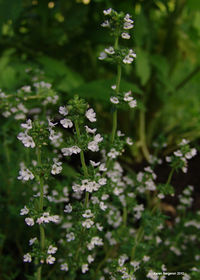Thymus vulgaris
| See Also | Botanical Monographs |
|---|
Thyme (Thymus vulgaris) is best known for its ability to fight infections associated with the respiratory system and skin. It is used as tea, oil, tincture and topically. To explore the characteristics, medicinal uses and prescribing considerations of this herb in more detail, check out the references indicated.[1], [2]
Contents
Characteristics
- Common Names: Thyme, Common thyme, French thyme, Garden thyme, Rubbed thyme
- Family: Laminaceae
- Habitat: Thymus vulgaris is native throughout Europe and the U.K. and is also cultivated in North America.
- Parts Used: Aerial parts
- Constituents: volatile oils (thymol and carvacrol), flavonoids
- Medicinal Actions: carminative, spasmolytic, antitussive, decongestant, expectorant, antipyretic, antibacterial, antifungal, antimicrobial, cardiac tonic, vulnerary, vasodilator, antioxidant, diaphoretic
Uses
Historical Uses:
Thymus vulgaris was used in Egypt for embalming. It was also given to knights to bring courage and placed on coffins to assure passage to the next life.
Medicinal Uses:
Cold Infusion
- as a digestive aid for dyspepsia with weak irritated stomach, sensitivity to a variety of foods, convalescence from chronic illness with poor appetite, irritable bowel syndrome
Warm Infusion
- as a digestive aid for flatulence and colic
- Other Conditions
Oil Inhalation
- asthma, lung cancer, bronchial disease, diphtheria, gangrene of the lung, upper respiratory catarrh, typhoid fever, tuberculosis (essential oil in humidifier and inhale 4-5 minutes, 8-10 daily)
Tincture
- spasmolytic, convulsive, or bronchial cough, whooping cough, soothing to a sore throat
Diluted and taken internally
- Conditions
Topical, oil
- antimicrobial, antiseptic and disinfectant for burns, eczema, tinea, putrid pus/ulcers, lichen planus
- Other Conditions
- cough applied directly on the chest to warm and cause vasodilation
Prescribing Considerations
The information provided is intended to augment the treatment from a naturopathic doctor or other trained medical professional. Although most herbs are generally safe, it is recommended that you avoid self-prescribing especially when there is an underlying ongoing medical condition, if you are on any prescription medications or if you are pregnant or breastfeeding.
Formulations and Preparation
- Tincture - 1-30 drops three times daily
- Fluid extract - 1-20 drops three times daily
- Essential oil - 1-10 drops (diluted)
- Infusion - 30-90mL three times daily
Safety
The safety and prescribing considerations for this herb include:[3], [4]
- Generally regarded as safe.
- Side-effects may include nausea, vomiting, gastric distress, headache, dizziness, convulsions, coma, cardiac and respiratory collapse from oral administration; and can be moderately irritated when administered topically.
- Caution should be used when using the essential oil; be sure to dilute or it may act as a mucosal irritant.
- Contraindicated in pregnancy due to spasmolytic properties.
- Drug-Herb Interactions are rare.
References
- ↑ Boon Heather, Smith Michael (2009) 55 Most Common Medicinal Herbs: The Complete Natural Medicine Guide Second Edition Institute of Naturopathic Education and Research, CCNM Toronto.
- ↑ Godfrey Anthony, Saunders Paul, Barlow Kerry, Gowan Matt (2011) Principles and Practices of Naturopathic Botanical Medicine, Advanced Botanical Medicine. V3 CCNM Press, Toronto.
- ↑ Stargrove Mitchell Bebell, Treasure Jonathan, McKee Dwight L (2008) Herb, Nutrient and Drug Interactions: Clinical Implications and Therapeutic Strategies
- ↑ Brinker Francis (1997) Herbal Contraindications and Drug Interactions: Plus Herbal Adjuncts With Medicines, 4th Edition Eclectic Medical Publications.
